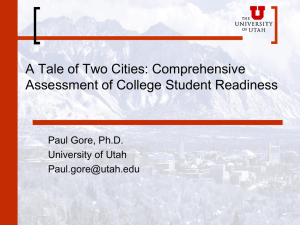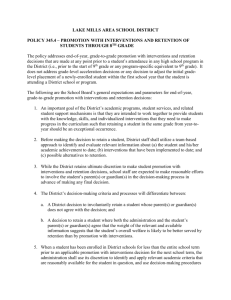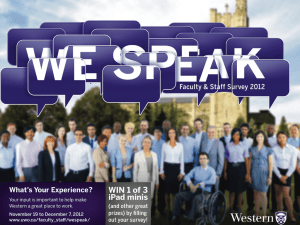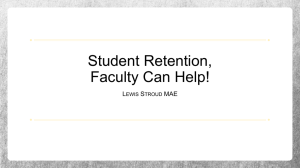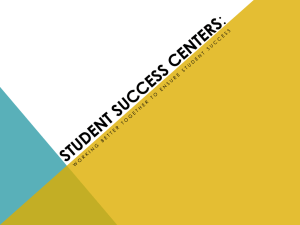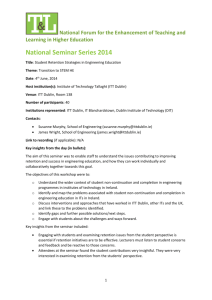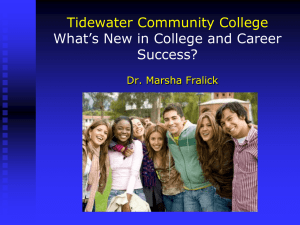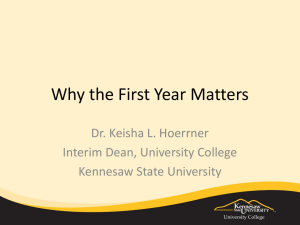Presentation What Makes the Best First Year Experience
advertisement
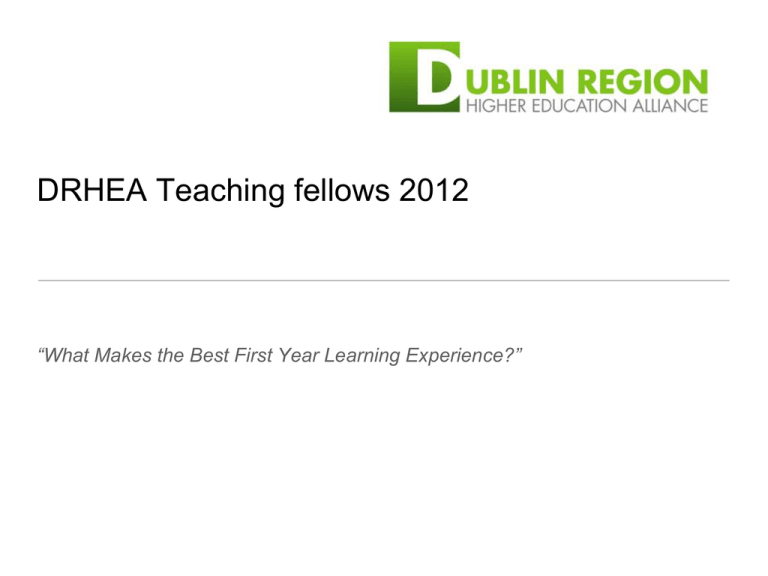
DRHEA Teaching fellows 2012 “What Makes the Best First Year Learning Experience?” DRHEA • Dublin Regional Higher Education Alliance DIT IADT DCU NUI Maynooth IT Blanchardstown TCD IT Tallaght UCD DRHEA Fellows Fellow Michael Carr Institute DIT Discipline Maths Tara Cusack UCD Physiotherapy Yseult Freeney DCU Psychology Mary Gilmartin NUI Maynooth Geography Rebecca Roper IADT Film, Theatre and Performance Studies Introduction • Higher Education institutions have become increasingly more aware of the importance of the first year experience. • .....as a foundation for educational persistence, completion and life long learning • Higher education institutions have a responsibility to: • The individual • To society The DRHEA project is underpinned by our intention to ask and answer the question: •‘What type of initiatives foster the best possible first year experience?’ Copyright: San Diego City College First Year Experience • What is being done internationally ? • What is being done in the Dublin Region ? • What are the issues in Higher Education Institutes in the Dublin Region ? First Year Experience • What is being done internationally ? • Lit Review (Tara Cusack) First Year Experience • What is being done in the Dublin Region ? • Website/Case Studies from the Dublin Region (Rebecca Roper) First Year Experience • What are the issues in Higher Education Institutes in the Dublin Region ? • Focus groups from each of the 8 institutes in the DRHEA (Mary Gilmartin and Yseult Freeney) A SYSTEMATIC REVIEW OF INSTITUTIONAL INTERVENTIONS INTENDED TO ENHANCE THE FIRST YEAR EXPERIENCE Tara Cusack Introduction • Higher Education institutions have become increasingly more aware of the importance of the first year experience. • .....as a foundation for educational persistence, completion and life long learning • Higher education institutions have a responsibility to: • The individual • To society The DRHEA project is underpinned by our intention to ask and answer the question: • ‘What type of initiatives foster the best possible first year experience?’ Systematic Literature Review • The purpose of this literature review was to examine systematically international research relating to the FYE in terms of: • Institution wide interventions • Outcomes Methods Search string developed Web of science ERIC British Education Index Australian Education Index Academic Search complete Psych Info Scopus Inclusion Criteria • Published from the year 2000 onwards • Published in English • Concerned first year students in third level education • Implemented and measured the outcome of interventions designed to enhance the first year experience. Initiatives Academic Social Practical Intersectional n=6 n=6 n=22 n=13 Initiatives Academic • 13 studies primarily from US (GPA and retention), nonrandomised controlled trials (specific course, mentoring programmes, learning communities). • 10 studies administered to all first year students. • 3 targeting academically ‘at risk’ students (poor engagement behaviour, low entry level). • In the majority of studies it is reported that participation in an academic intervention resulted in improved GPA and student retention when compared to non participation. Social • 6 studies, primarily non-randomised controlled trials (GPA, retention rates) • 4 were mentoring studies. • 1 was a counseling study. • 1 examined a skills course. • No significant difference (n=3) following interventions in terms of GPA, no change in terms of retention rates (n=2). Retention rates significantly improved following skills course. Practical • 6 studies in this category (alcohol consumption (n=3), nutrition (n=2), financial (n=1). • 2 studies concerning alcohol showed a decrease in consumption, while 1 showed no change. • 2 studies concerning nutrition (prevention of weight gain) showed limited success. • 1 study, financial aid led to significantly increased GPA. Intersectional • 22 studies in total, mainly non randomised controlled trials. • 14 examined the value of a specific module/course for first years (6/14 significant change) • 7 examined learning communities • 1 examined a first year drop-in centre (significant change 0.02) • All studies examining learning communities (n=7) reported benefits across a wide range of academic and social domains with n=4 reporting significant improvement in social abilities, collaborative learning and knowledge of wellness. Discussion • Much of the institutional scale initiatives relating to FYE are based in the US. • Focussed on a limited understanding of academic achievement (retention rates, graduation rates, GPA) • Initiatives seen across the world were in the main small scale, exclusive to particular disciplines, or had limited student access. Copyright: Ferris State University Discussion • Growing emphasis on intersectional approaches. • Academic achievement receives most attention however increasingly social interventions such as learning communities are being used for which there is strong evidence. • Limited emphasis on solely practical or social interventions despite evidence supporting their success. Discussion • Orientation programmes demonstrate limited success in terms of academic performance • Practical interventions had limited long term benefit in terms of student behaviour Copyright: Humber College, Lakeshore · http://www.humber.ca/first-yearexperience • Conflicting evidence as to the benefit of First Year Experience programmes or seminars. • Most consistent evidence is in favour of learning communities. Statistically significant positive impact on student academic and social engagement. Review Institution initiatives are frequently unclear or limited and outcomes are frequently easily measurable outcomes (retention, GPA) as opposed to appropriate measures of enhancing the FYE. Website and Case Studies: Audit of Practice Rebecca Roper Website • Concept • Current Content includes: • Background to the Project and the Fellowship. • Video Interviews with the 5 Teaching Fellows and Elizabeth Noonan. • Video Interviews with 6 International practitioners, including Cathy Bouvill. • Toolkit brochure. • Case Studies. www.drhea.ie Launch: mid December, 2012 Case Studies • Background and Questionnaire. • Currently, 12 case studies from established First Year Initiatives have been submitted from 5 of the DRHEA Institutions. • Range of Studies, from Peer Mentoring to Proximal Learning. • Call for other participants via the website. FOCUS GROUPS Yseult Freeney, Mary Gilmartin Focus Groups • To be held in all 8 DRHEA institutions • Participants include: • Academic staff • Professional, managerial and support staff • Student union representatives • Key themes emerged across all institutions STRATEGY Responsibility for the First Year Experience Planning and Co-ordination Responsibility for the First Year Experience • ‘Your job is to go in and teach class and that’s it. The other stuff is not your responsibility’ • ‘There is no coherent articulated plan for the first year experience’ Planning and Co-ordination • ‘there is disconnect between the different areas’ • 'we're all going around and probably asking the same question...and yet there is no place we can go to say well what are the results' • where is the space to make 'good practice common practice’? TRANSITION: ORIENTATION The importance and value of orientation for students Elongating transitional orientation initiatives and embedding transition in academic programmes The importance and value of orientation for students • ‘all of the research is telling us that that first semester is a critical time for embedding them and making them feel that this is their university and then holding on to them.’ • ‘just an awareness that there is something that they have to do as a learner, to move from a passive experience, to a more active experience. That’s a huge jump for someone, because, the idea that the responsibility lies with them, is something that can be quite a shock to the system, to begin with.’ • ‘...there is such a different atmosphere if they’ve been through orientation… they come down to me and say it was brilliant, we made so many friends and they’re so excited about college. It does work…’ Elongating transitional orientation initiatives & embedding into academic programmes • ‘…it’s a little bit cramped, the induction itself… the strategy that we all came up with is that we would elongate it into maybe six months and embed it into different courses…studies suggest that is the best way to do it… to drip feed them into it’ • ‘I just think that there is so much information to hit the ground running with, and while there is a lot of support, there is such a complexity to first year’ • ‘..we spoke of putting together a XXX101 module, based on study skills, orientation, integration, telling them what the university is about… would be built into each programme…we didn’t seem to be able to find five credits… it just seems mad’ SOCIAL ENGAGEMENT: COMMUNITY The importance for students of feeling part of a community Identifying with other people in their programme confirms their choice of course Being part of a social community supports their academic engagement The importance for students of feeling part of a community • “I mean the aim is to try and make students feel as welcome as possible, to help them settle in, and to build a foundation that they can build on in second and third year as well” Identifying with other people in their programme confirms their choice of course • ‘It’s not just making friends, but feeling comfortable within their programme in particular… being able to spend time among 20, 30, 40 students who they will have a sense of belonging with over the next four years… it’s the comfort of knowing someone that is on the same path as you are’ • ‘…students who are able to identify themselves within a particular class setting, settle in a lot better quickly because they are forced together for those first few weeks and they get to know everyone at the table and it really makes a big difference.’ • ‘.. They are more confirmed in their choice of programme.’ Being part of a social community supports their academic engagement • ‘a person may disengage because they’re not socially embedded in the programme…’ • ‘… integration of 1st year students with students from other years is absolutely critical… we learn through informal interaction with any community… you actually learn through the informal networks…’ • ‘there is such a different atmosphere if they’ve been through orientation… they come down to me and say it was brilliant, we made so many friends and they’re so excited about college. It does work…’ • ‘… integration of 1st year students with students from other years is absolutely critical… we learn through informal interaction with any community… you actually learn through the informal networks…’ ACADEMIC ENGAGEMENT: RETENTION Why students drop out Improving retention rates Why do students drop out? • ‘there is almost an acceptance of a level of loss across the [institution] that is acceptable, unreported and unanalyzed’ • 'we put a lot of resources into recruitment. If we were to look at how [much] we spend per student we recruit, versus how much we spend per student we have and lose, I'd ask is the mix correct?' Improving retention rates • Assessment, early warning, identifying ‘at-risk’ students • 'I think lots of students rather than shouting and kicking and screaming...just quietly fade away' TEACHING AND LEARNING Support for academic staff Policy-practice disconnect Support for academic staff • 'What supports are there for academics to support the students?' • 'there is almost a sense of well that's easy enough delivered‘, yet a 'massive massive job‘ that requires being in 'survival mode' Policy-practice disconnect • ‘we have lots of policies in this institution…[but] I’d say very few of our lecturers have read them. And, that’s not a fault of the lecturers…’ • 'There is fantastic work being done within a set of walls, but the set of walls just don't work for what we're trying to fit into it....[W]e've decorated and decorated and repapered the walls as much as we can. But now actually we have to admit that no, the shape of the room doesn't actually work‘. Conclusion Acknowledgements • Elizabeth Noonan • Christina Quinlan • Noel Brady • Niamh Moore and Amanda Gibney • Mary Antonesa and Ciaran Quinn • Daibhi O’Deorain • Focus Group Participants • Case Study Volunteers The First Year Experience UCD November 30th 2012
